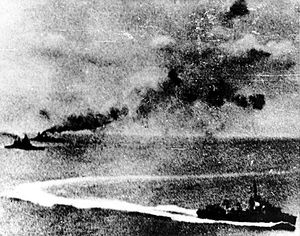HMS Prince of Wales (1941): Difference between revisions
imported>Howard C. Berkowitz (New article generated using Special:MetadataForm) |
imported>Howard C. Berkowitz No edit summary |
||
| Line 1: | Line 1: | ||
{{subpages}} | {{subpages}} | ||
{{TOC|right}} | |||
'''HMS Prince of Wales''' was a [[Royal Navy]] battleship of the [[King George V-class]], whose entire operational life was less than the year 1941. | |||
==Characteristics== | |||
She was a 35,000 post-treaty ship, with a main battery of | |||
==Operations== | |||
In May 1941, she was sent out, shipyard workmen still on board, to hunt the German battleship ''[[DKM Bismarck]]'', in company with the [[battlecruiser]] ''[[HMS Hood]]'', along with two cruisers. On encoutering ''Bismarck'' and ''DKM Prinz Eugen'', she was damaged and ''Hood'' sunk. | |||
After repairs, she carried Prime Minister [[Winston Churchill]] "across the Atlantic to Newfoundland. There, on 9-12 August, Churchill joined U.S. President Franklin D. Roosevelt for the Atlantic Charter conference, the first meeting between the two English-speaking leaders of what was emerging as the "Grand Alliance" against the Axis powers.<ref>{{citation | |||
| url = http://www.history.navy.mil/photos/sh-fornv/uk/uksh-p/pow12.htm | |||
| title = HMS Prince of Wales, battleship, 1941-1941 | |||
| publisher = U.S. Naval Historical Society}}</ref> | |||
After that conference, she was sent to the Mediterranean, where she successfully engaged Italian planes off Malta in late September, and then to Pacific waters to deal with the increasing Japanese threat. | |||
[[Image:Loss of Prince of Wales and Repulse.jpg|thumb|300px|left|''HMS Prince of Wales'' and ''HMS Repulse'' under final air attack]] | |||
On 10 December 1941, steaming in the Pacific with the battlecruiser ''HMS Repulse'' both were sunk by Japanese aircraft. They were the first capital ships to be sunk, while underway, by aircraft. | |||
==Legacy== | |||
The second [[aircraft carrier]] of the [[Queen Elizabeth (carrier)-class]], to be operational in 2018, will bear the name ''HMS Prince of Wales''. | |||
==References== | |||
{{reflist}} | |||
Revision as of 13:02, 24 August 2010
HMS Prince of Wales was a Royal Navy battleship of the King George V-class, whose entire operational life was less than the year 1941.
Characteristics
She was a 35,000 post-treaty ship, with a main battery of
Operations
In May 1941, she was sent out, shipyard workmen still on board, to hunt the German battleship DKM Bismarck, in company with the battlecruiser HMS Hood, along with two cruisers. On encoutering Bismarck and DKM Prinz Eugen, she was damaged and Hood sunk.
After repairs, she carried Prime Minister Winston Churchill "across the Atlantic to Newfoundland. There, on 9-12 August, Churchill joined U.S. President Franklin D. Roosevelt for the Atlantic Charter conference, the first meeting between the two English-speaking leaders of what was emerging as the "Grand Alliance" against the Axis powers.[1]
After that conference, she was sent to the Mediterranean, where she successfully engaged Italian planes off Malta in late September, and then to Pacific waters to deal with the increasing Japanese threat.
On 10 December 1941, steaming in the Pacific with the battlecruiser HMS Repulse both were sunk by Japanese aircraft. They were the first capital ships to be sunk, while underway, by aircraft.
Legacy
The second aircraft carrier of the Queen Elizabeth (carrier)-class, to be operational in 2018, will bear the name HMS Prince of Wales.
References
- ↑ HMS Prince of Wales, battleship, 1941-1941, U.S. Naval Historical Society
